Discover Political Philosophy
Political Philosophy

Political Philosophy
Author: Dr Johnson
Subscribed: 153Played: 2,078Subscribe
Share
© Laurie M Johnson
Description
A podcast devoted to the history of political thought in the spirit of sharing, not perfection. Explanation and discussion of classic and contemporary political ideas. YouTube: YouTube.com/politicalphilosophy
282 Episodes
Reverse
Get in on everything we do: https://patreon.com/maurinacademy … More Persecution and Horse Logic (Persecution and the Art of Writing, 3)
You can find out more about this class, coming Feb. 4, 2026, here: https://pmaurin.org/antimodern-progress-contradiction-or-christian-alternative/ … More Antimodern Progress: The Ideas of Jacques Maritain (Upcoming Class)
Get in on everything we do: https://patreon.com/maurinacademy … More Why Exoteric Writing? (Strauss, Persecution and the Art of Writing, 2)
This is the introductory lecture for a series on Persecution and the Art of Writing by Leo Strauss. … More Introduction to Persecution and the Art of Writing by Leo Strauss (New Series)
Dr John Fliter, author of U.S. vs. Darby Lumber Co.: The Triumph of Fair Labor Standards (University Press of Kansas, 2025), is our guest today. The interview covers the history of the struggle for fair labor standards in the US, the Fair Labor Standards Act, and the state of labor today. … More Fair Labor Standards in the United States: A Conversation With Constitutional Law Expert John Fliter
This is my talk from a recent visit to Milwaukee to view Maurin documents at Marquette University. It was part of a Catholic Worker roundtable with Lincoln Rice. It represents my initial thoughts on how Maurin's life, in some ways, is a microcosm of modern dislocation, not any extensive research on Maurin, which is ongoing. … More Dislocation as a Symptom of Modernity: The Case of Peter Maurin (Recent Talk)
Stephen Paff, host of Democracy Demythologized and author of the Ethnodata blog joined Laurie for a conversation about AI. This is a short segment of a longer conversation and discussion with patrons of the Maurin Academy. … More What AI Means (And Doesn’t Mean) for Our World, with Stephen Paff (Excerpt)
Pastor Caleb Campbell, Desert Springs Bible Church, has published a new book, Disarming Leviathan: Loving Your Christian Nationalist Neighbor, with Blackstone Publishing. It is available in paperback, Kindle and Audible editions. https://www.amazon.com/Disarming-Leviathan-Christian-Nationalist-Neighbor/dp/B0DB2NV6F7 … More Pastor Caleb Campbell: Disarming Leviathan
We finish up the discussion of Jerzy Kosinski's novel Being There with "Chauncey Gardiner" being launched into the stratosphere of American power while being an acknowledged complete unknown on both sides of the Cold War. What does this satirical novel have to say about our lack of common sense? … More The Usefulness of Common Sense in the Age of Digital Deception (Being There 6)
On the Maurin Academy's Political Philosophy podcast, Laurie is covering Jerzy Kosinski's Being There, a satirical novel about an image and wealth-obsessed American society bent on the mass narcissism of literally loving a politician. This is part 5 in the series. … More The Vulnerabilities of Democracy in the Age of Image
We continue with our discussion of Jerzy Kosinski's novel, Being There, at the point where "Chauncey Gardiner," mistaken for a wealthy and handsome businessman, meets the President of the United States and the American press--and a desperate heiress. … More Romantic Democracy: The Blind Following the Blind. (Kosinski’s Being There, 4)
We continue with our discussion of Jerzy Kosinski's novel, Being There, at the point where "Chauncey Gardiner" meets EE by accident and gets mistaken for a wealthy and handsome businessman. … More An Empty Signifier Makes an Ideal Lover (Being There, Part 3)
Jerzy Kosinski's "Being There" satirizes American democracy and the influence of electronic media on society. The video reviews the novel's initial chapters, which inspired a film featuring Peter Sellers and Shirley MacLaine. Additional resources include the Maurin Academy's podcasts and social media for updates on classes and events. … More Victim or Boss? Depends on Your Perspective (Being There, Part 2)
We begin a new series inspired by Jerzy Kosinski's classic novel, Being There (1971). Being There is a satirical and allegorical tale about the adventures of Chance, a simple gardener who has previously lived a sheltered life saturated with television as his main source of human contact. Chance is thrown into the media spotlight by accident, propelling him to the top echelons of American politics, as people read wisdom into everything he says. … More From Gardener to Politician: The Impact of Media in ‘Being There’ (1)
This is a segment of an hour long lecture followed by a Q & A session for patrons of the Maurin Academy. To get the entire course and all the courses, reading groups and our lecture series, support us on Patreon: https://patreon.com/maurinacademy … More Thomas Aquinas’s Natural Law Theory: Brief Explanation (Aristotle’s Virtue Ethics Public Segment #4)
This is a segment of an hour long lecture followed by a Q & A session for patrons of the Maurin Academy. To get the entire course and all the courses, reading groups and our lecture series, support us on Patreon: https://patreon.com/maurinacademy … More The Quality of Friendships: Does it Matter for Politics? Aristotle’s Virtue Ethics Public Segment #3
This is a segment of an hour long lecture followed by a Q & A session for patrons of the Maurin Academy. To get the entire course and all the courses, reading groups and our lecture series, support us on Patreon: https://patreon.com/maurinacademy … More Introduction to Aristotle’s Virtue Ethics, Public Segment #2: The Mean Between Extremes
Starting June 19, the Maurin Academy will host a class by Deacon Chris May on Ivan Illich. Here Deacon May discusses who Illich was and why we should know more about him. … More Introduction to Ivan Illich: A New Maurin Academy Class Starting June 17
We finish up Federalist 51 and end the series on Federalist 10 and 51, the basics of American Political Thought. … More The Relationship Between Freedom and Justice (Federalist 51, Part 3)
In Federalist 51, the author asserts that the legislative branch is always the strongest branch in a republic. Why, and is this true? The founders wanted a government that helped people enjoy their liberty, but has the definition of liberty changed? … More American Liberty: How Is It Secured? (Federalist 51 Part 2)






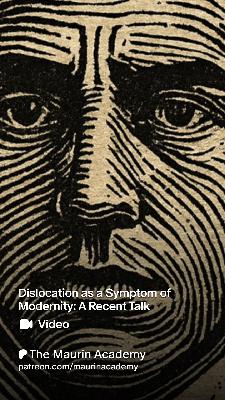
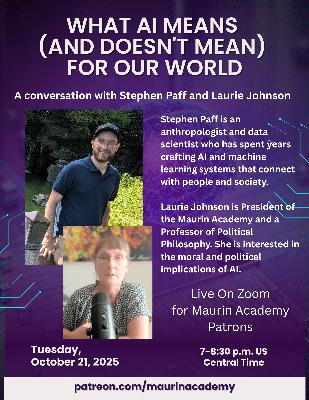



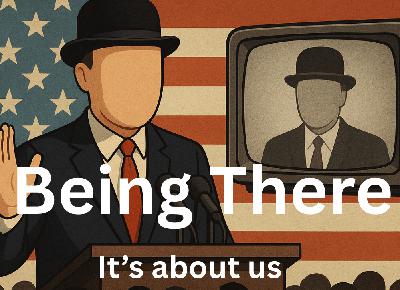

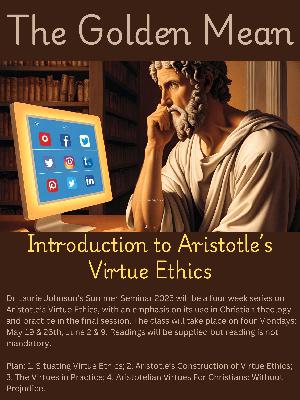

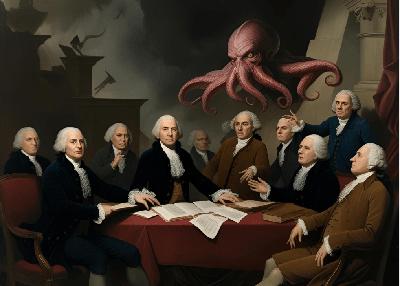




Only about half of Greek city states joined the Athenian-Spartan led effort to repel the second invasion of Greece. Persia was engaged in Greek affairs from 489BC until the end of the Peloponnesian War. After Xerxes' second invasion was repelled, both Athens and Sparta at different times formed temporary and expedient alliances with Persia. But a key point of interest here is the fact that as far back as 2500 years ago, stronger powers felt it necessary to meddle in the internal affairs of their subject states or allies. The US has followed this pattern but China has not. Perhaps statesmen in China are paying more heed to Thucydides than America is.
Sparta had no part whatsoever in the Battle of Marathon. Only the Plataeans joined Athens in repelling the Persian invasion led by Darius. Sparta welcomed Thucydides after the Athenians exiled him for his part in the loss of Amphipolis. Thucydides was also related to Cimon, an Athenian statesman and strategos, an elected general, who had close ties to Sparta and acted as their proxenos, or representative, in Athens. Despite being an Athenian strategos himself, Thucydides is very even-handed in his portrayal of both Athens and Sparta.